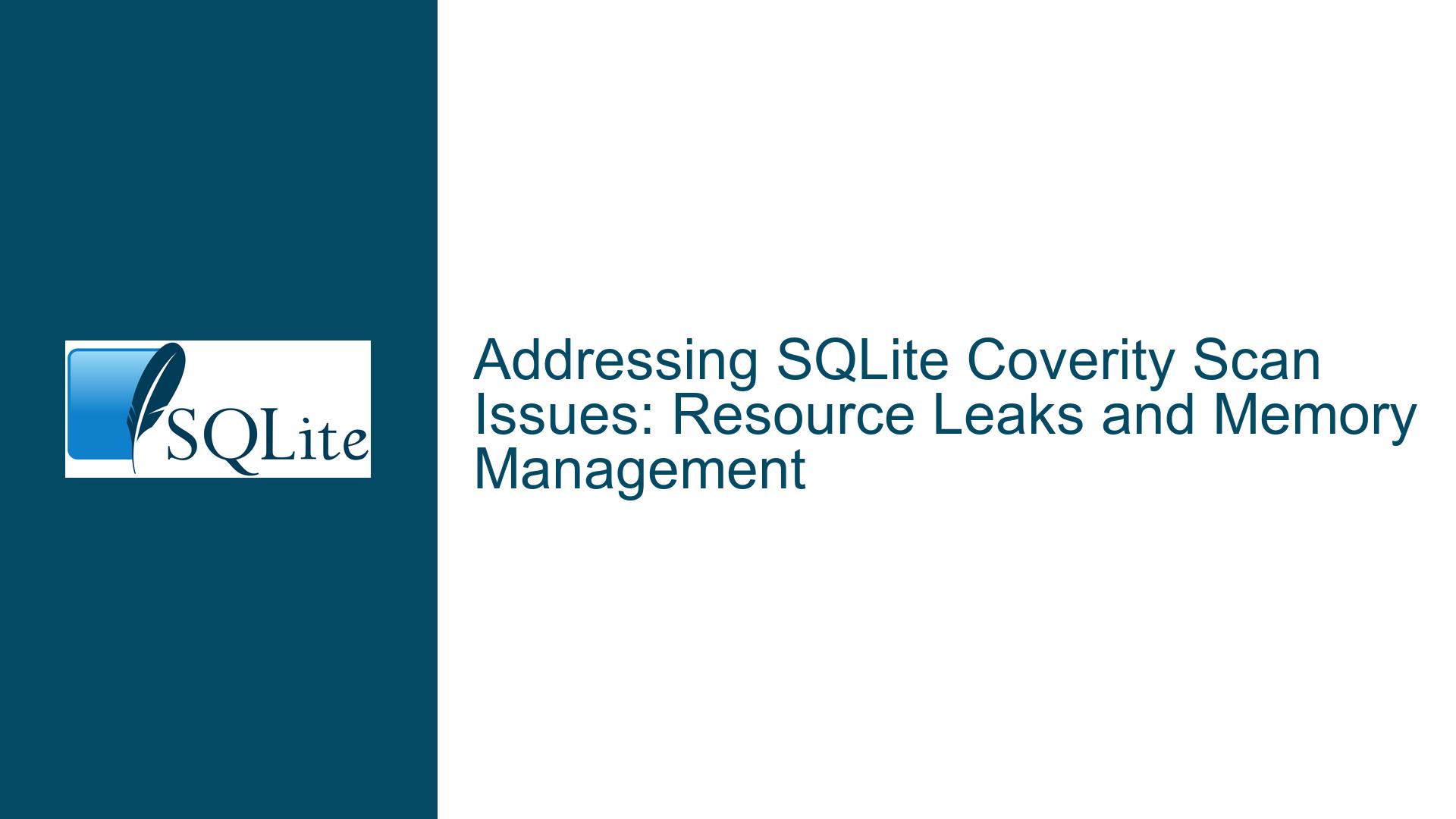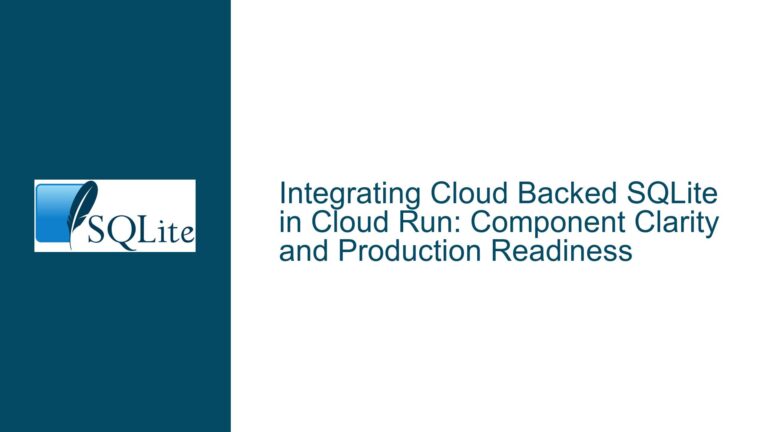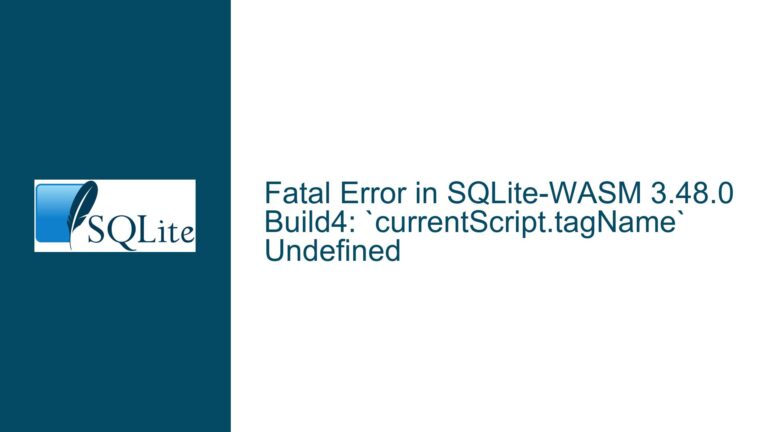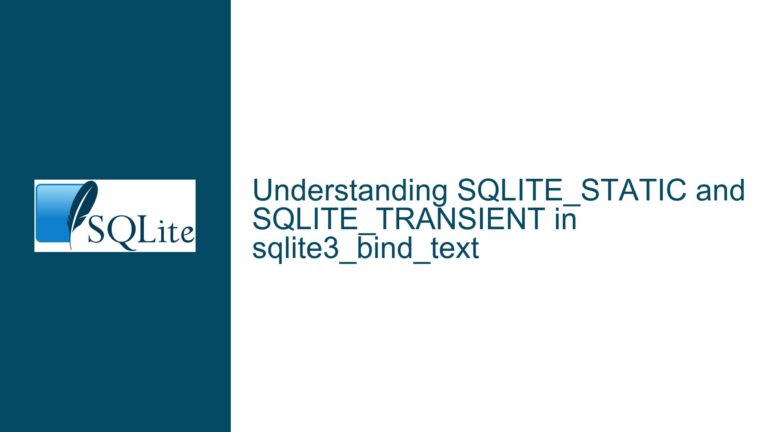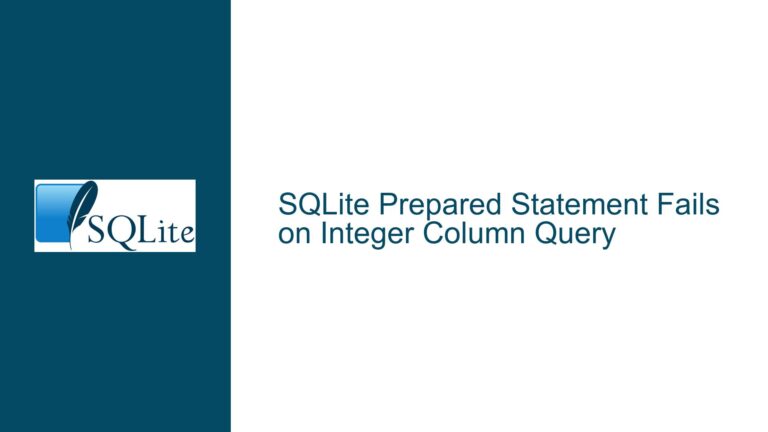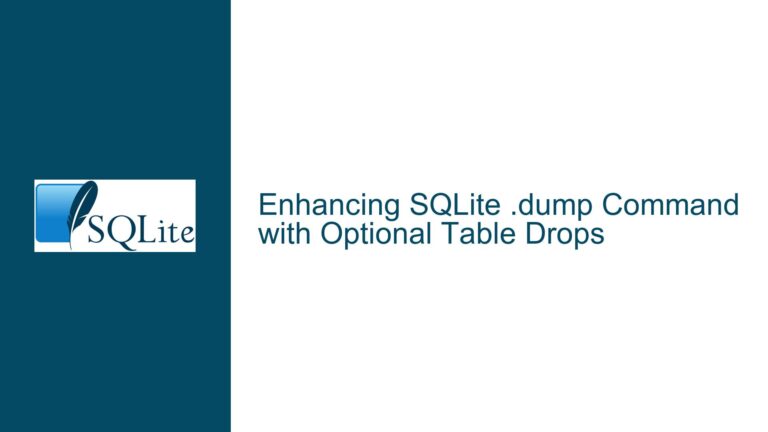Addressing SQLite Coverity Scan Issues: Resource Leaks and Memory Management
Understanding Resource Leaks, Use-After-Free, and Double-Free Errors in SQLite Code
Issue Overview: Resource Leaks, Pointer Misuse, and Memory Corruption
The core issues identified in the provided SQLite codebase revolve around improper memory management, leading to resource leaks, use-after-free vulnerabilities, and double-free errors. These problems were flagged by Coverity’s static analysis tool, which detects patterns in code that could result in undefined behavior, crashes, or security exploits. Let’s break down each category:
Resource Leaks (CWE-772)
These occur when dynamically allocated memory (via functions likesqlite3_malloc,malloc, or custom allocators) is not freed before a function exits or a pointer goes out of scope. Over time, such leaks degrade performance and exhaust system memory. Examples include:- Failure to free
Decimal *pAindecimalSubFuncwhenpBallocation fails. - Leaking
zErr,zErrMsg, andzTemppointers in shell utilities and FTS3/5 modules due to missingsqlite3_free()calls.
- Failure to free
Use-After-Free (CWE-416)
A pointer is dereferenced or used after its associated memory has been freed. This leads to undefined behavior, including data corruption, crashes, or exploitation vectors. Key instances include:- Reassigning freed pointers like
pCsr->pFreeEntryin ZIP file handling. - Accessing
pWal->apWiDataafter it was freed in Write-Ahead Log (WAL) operations.
- Reassigning freed pointers like
Double-Free Errors (CWE-590)
Freeing the same memory block multiple times corrupts the heap’s internal structures. Examples:- Freeing
pWal->apWiDatatwice in WAL checkpointing logic. - Incorrect
sqlite3_free_table(&res.azResult[1])calls, which attempt to free invalid addresses.
- Freeing
Copy-Paste Errors and Logic Flaws
Typographical errors in variable names (e.g.,regStartRowidinstead ofregEndRowid) and incorrect pointer aliasing (e.g.,pScanOrig = p->pScan) lead to logic errors and memory mismanagement.
Root Causes: Why These Issues Arise in SQLite’s Codebase
Understanding the root causes of these issues requires analyzing SQLite’s design patterns, the complexity of its subsystems (e.g., WAL, FTS), and how manual memory management interacts with error-handling workflows.
Complex Error-Handling Paths
SQLite prioritizes robustness, leading to deeply nested error checks. However, this increases the risk of missing cleanup steps in rare code paths. For example:- In
decimalSubFunc, the earlyreturnwhenpB == 0skipped freeingpA. - In
run_schema_dump_query,zErrwas freed inside a conditional block but not in all exit paths.
- In
Pointer Aliasing and Ownership Ambiguity
Functions likeidxScanFreeandidxStatementFreeaccept aliased pointers (pScanOrig,pStmtOrig), leading to confusion about which code path owns the pointer. This results in:- Use-after-free when a freed pointer is reassigned (
p->pScan = pScanOrig). - Double-free if aliased pointers are freed in multiple locations.
- Use-after-free when a freed pointer is reassigned (
Subsystem-Specific Memory Models
Subsystems like the WAL module use custom memory management patterns. For instance:walIndexAppendandsqlite3WalCheckpointboth manipulatepWal->apWiData, but improper sequencing of frees leads to use-after-free.- FTS3/5’s document merging logic (
fts3DoclistOrMerge) leaksaNewandaMergedue to incomplete cleanup in recursive code paths.
Legacy Code and Code Reuse
Copy-paste errors (e.g.,regStartRowidvs.regEndRowid) often stem from reusing code blocks without adjusting variable names. Similarly, thesqlite3_analyzertool shares code with the main SQLite library, propagating errors across components.Inconsistent Error Recovery
Functions likesqlite3Reallocmay free the original buffer before allocating a new one. If the allocation fails, subsequentsqlite3_free(pMem->z)attempts to free an already-freed pointer.
Resolving the Issues: Step-by-Step Fixes and Best Practices
To address these issues systematically, we’ll categorize fixes based on the type of vulnerability and provide code examples to illustrate corrections.
1. Fixing Resource Leaks
Problem: Failing to free allocated memory before returning from a function.
Solution: Audit all error-handling paths to ensure resources are released.
Example 1: decimalSubFunc Leak
Original Code:
Decimal *pA = decimal_new(...);
Decimal *pB = decimal_new(...);
if( pB==0 ) return; // Leaks pA
Fix: Free pA before returning:
if( pB==0 ) {
decimal_free(pA);
return;
}
Example 2: Leaking zErr in Shell Utilities
Original Code:
char *zErr = NULL;
sqlite3_exec(db, zSql, ..., &zErr);
// zErr not freed if no error occurs
Fix: Free zErr unconditionally:
sqlite3_free(zErr);
General Approach:
- Use tools like
valgrindor AddressSanitizer to identify leaks. - Adopt a "cleanup guard" pattern:
char *resource = allocate(); if (error) goto cleanup; // ... use resource ... cleanup: free(resource);
2. Eliminating Use-After-Free and Double-Free Errors
Problem: Accessing or freeing memory after it has been released.
Solution: Nullify pointers after freeing and avoid aliasing.
Example 1: Use-After-Free in ZIP File Handling
Original Code:
zipfileResetCursor(pCsr); // Frees pCsr->pFreeEntry
pCsr->pCurrent = pCsr->pFreeEntry ? ... ; // Uses freed pointer
Fix: Nullify pFreeEntry after freeing:
void zipfileResetCursor(...) {
free(pCsr->pFreeEntry);
pCsr->pFreeEntry = NULL; // Prevent reuse
}
Example 2: Double-Free in WAL Checkpoint
Original Code:
sqlite3WalCheckpoint(...); // Frees apWiData
sqlite3_free(pWal->apWiData); // Double-free
Fix: Ensure apWiData is only freed once. Remove the redundant free:
// sqlite3WalCheckpoint already frees apWiData; no need to free again
General Approach:
- After freeing a pointer, set it to
NULLto prevent reuse. - Use static analysis tools to detect aliased pointers (e.g.,
pScanOrig = p->pScan). - Refactor functions to avoid passing ownership of pointers through aliases.
3. Correcting Copy-Paste and Logic Errors
Problem: Typos or incorrect variable names due to code replication.
Solution: Code reviews and unit tests targeting specific subsystems.
Example: regStartRowid vs. regEndRowid
Original Code:
if( pMWin->regStartRowid ) { // Should be regEndRowid
sqlite3VdbeAddOp2(v, OP_AddImm, pMWin->regEndRowid, 1);
}
Fix: Correct the variable name:
if( pMWin->regEndRowid ) {
// ...
}
General Approach:
- Use IDE-based refactoring tools to rename variables systematically.
- Write test cases that trigger logic in window functions (
pMWin).
4. Improving Memory Management in Subsystems
Problem: Subsystems like WAL and FTS3/5 have complex memory ownership rules.
Solution: Clarify ownership and centralize cleanup.
Example: WAL apWiData Management
Issue: Multiple functions (walIndexAppend, sqlite3WalCheckpoint) free apWiData without coordination.
Fix: Designate a single owner for apWiData and document cleanup responsibilities:
// In sqlite3WalClose:
sqlite3_free(pWal->apWiData); // Only free here if not already freed
pWal->apWiData = NULL;
Example: FTS3 Document List Leaks
Issue: fts3DoclistOrMerge leaks aNew and aMerge buffers.
Fix: Ensure all code paths free temporary buffers:
static int fts3DoclistOrMerge(...) {
char *aNew = NULL, *aMerge = NULL;
// ...
if( rc!=SQLITE_OK ) goto cleanup;
// ... process ...
cleanup:
sqlite3_free(aNew);
sqlite3_free(aMerge);
return rc;
}
5. Addressing Bad Free and Pointer Arithmetic Errors
Problem: Freeing invalid addresses or incorrect pointer arithmetic.
Solution: Validate pointers before freeing and avoid offset-based frees.
Example: sqlite3_free_table(&res.azResult[1])
Issue: sqlite3_free_table expects the address of the array (res.azResult), not an offset.
Fix: Use the correct API:
sqlite3_free_table(res.azResult); // Frees entire array
Example: Lemon Parser Generator Leak
Issue: pathbuf allocated but not freed in lemony code.
Fix: Free pathbuf before returning:
char *pathbuf = malloc(...);
// ... use pathbuf ...
free(pathbuf);
return path;
6. Enhancing Static Analysis and Testing
Problem: Coverity’s false positives and missed true positives.
Solution: Refine analysis rules and increase test coverage.
- Suppress False Positives: Use Coverity annotations (e.g.,
// coverity[leaked_storage]) for intentional leaks (e.g., singleton contexts). - Add Regression Tests: Create test cases that trigger error paths (e.g., OOM conditions) to verify cleanup.
- Integrate Sanitizers: Build SQLite with
-fsanitize=address,undefinedto catch runtime memory errors.
By addressing these issues methodically—ensuring all resources are freed, avoiding pointer reuse, and refining subsystem memory models—developers can significantly improve SQLite’s reliability and security. The provided patches are a strong starting point, but ongoing vigilance via static analysis, testing, and code reviews is essential to maintain robustness.
